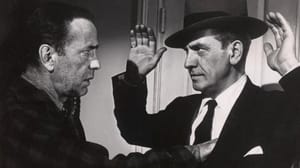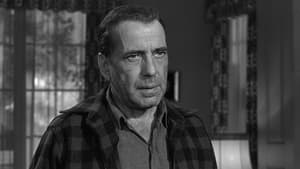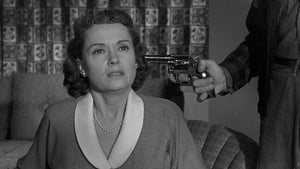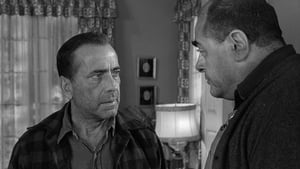Contact: info@alwanfilm.com
Video Sources 0 Views
- Watch trailer
- The Desperate Hours

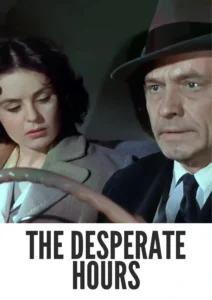
Synopsis
Table of Contents
ToggleThe Desperate Hours 1955 Colorized: A Tense Thriller Reimagined – A Review

Introduction
In the annals of classic cinema, “The Desperate Hours” stands as a testament to the enduring power of suspense and intrigue. Originally released in 1955, this gripping thriller has been revitalized with an early colored version, offering audiences a fresh perspective on its harrowing tale of captivity and survival. In this review, we delve into the significance of the film’s early colored rendition, exploring how colorization enhances the tension and drama of “The Desperate Hours” and cements its status as a timeless classic.
Check The Full Colorized Movies List
Check Our Colorized Movies Trailer Channel
Understanding The Desperate Hours 1955 Colorized: Director, Cast, and Genre
Directed by William Wyler, “The Desperate Hours” unfolds with the precision and intensity characteristic of the master filmmaker. At its core is a powerhouse performance by Humphrey Bogart, whose portrayal of escaped convict Glenn Griffin is as chilling as it is unforgettable. Bogart is joined by a stellar ensemble cast, including Fredric March and Arthur Kennedy, whose nuanced performances elevate the film to new heights. Blending elements of crime, drama, and suspense, “The Desperate Hours” captivates audiences with its gripping narrative and taut direction.
Exploring the World of The Desperate Hours 1955 Colorized: Plot and Characters
Set in suburban Indianapolis, “The Desperate Hours” follows the harrowing ordeal of the Hilliard family, whose lives are forever changed when three escaped convicts invade their home. As tensions escalate and the threat of violence looms large, the Hilliards must band together to outwit their captors and secure their freedom. Led by patriarch Dan Hilliard, portrayed with steely resolve by Fredric March, the family’s struggle for survival becomes a gripping battle of wits and wills. Through its compelling characters and pulse-pounding storyline, “The Desperate Hours” offers a riveting exploration of fear, courage, and the resilience of the human spirit.
The Art of Film Colorization
Colorization has emerged as a transformative tool in the realm of classic cinema, offering filmmakers the opportunity to reimagine and revitalize timeless treasures for contemporary audiences. By infusing black-and-white footage with vibrant hues and textures, colorization breathes new life into beloved classics, inviting viewers to experience them in a fresh and immersive way. While some purists may question the necessity of colorization, others see it as a valuable means of preserving and reimagining cinematic treasures for future generations to enjoy.
Early Colored Films: A Brief History
The history of early colored films is a testament to the evolution of cinematic technology and innovation. From the earliest experiments with hand-tinted prints to the advent of Technicolor and Eastmancolor, the emergence of colorization has transformed the visual landscape of cinema, offering filmmakers new avenues for artistic expression and creativity. As the technology continues to evolve, so too does its potential to shape the future of filmmaking and storytelling.
The Desperate Hours 1955 and Its Early Colored Version
The decision to release “The Desperate Hours” in an early colored version marks a bold departure from tradition, offering audiences a fresh perspective on this gripping thriller. By infusing the film with vibrant hues and textures, colorization heightens the tension and drama of “The Desperate Hours,” immersing viewers in its atmospheric world of fear and uncertainty. Whether experienced in its original black-and-white format or its early colored rendition, “The Desperate Hours” remains a gripping and unforgettable cinematic experience.
The Debate Over Film Colorization
The debate over film colorization has long been a contentious issue in the world of cinema. While some argue that colorization detracts from the artistic integrity of a film, others see it as a valuable means of preserving and reimagining cinematic classics for modern audiences. As filmmakers and audiences continue to grapple with questions of authenticity and artistic vision, the debate over film colorization remains as vibrant and contentious as ever.
Examining The Desperate Hours 1955 as an Early Colored Film
For fans of classic cinema, the early colored version of “The Desperate Hours” offers a thrilling and immersive viewing experience. From the shadowy interiors of the Hilliard home to the sun-dappled streets of suburban Indianapolis, colorization enhances the visual impact of the film and immerses viewers in its richly textured world of suspense and intrigue. Whether viewed in its original black-and-white format or its early colored rendition, “The Desperate Hours” stands as a timeless masterpiece of suspense and drama.
Influence and Legacy: The Desperate Hours 1955 Colorized’s Impact on Cinema
“The Desperate Hours” has left an indelible mark on the landscape of cinema, inspiring generations of filmmakers and captivating audiences with its gripping narrative and powerful performances. Its influence can be seen in the countless thrillers that have followed in its wake, as well as in the enduring popularity of Humphrey Bogart’s portrayal of Glenn Griffin. The film’s early colored version has also contributed to its legacy, sparking conversations about the role of colorization in preserving and reimagining cinematic classics for modern audiences.
Director’s Cinematic Legacy: Beyond The Desperate Hours 1955 Colorized
William Wyler’s legacy extends far beyond “The Desperate Hours,” with the director leaving an indelible mark on the world of cinema. His innovative storytelling techniques, meticulous attention to detail, and distinctive visual style have earned him a place among the pantheon of great filmmakers. Wyler’s influence can be seen in the work of directors who have been inspired by his unique approach to storytelling, ensuring that his legacy will endure for generations to come.
Themes Explored in The Desperate Hours 1955 Colorized
At its core, “The Desperate Hours” is a film about the struggle for survival and the lengths to which people will go to protect themselves and their loved ones. Themes of fear, courage, and moral ambiguity pervade the narrative, as the Hilliard family grapples with the terrifying reality of their situation. Through its tense and suspenseful storyline, the film offers a gripping exploration of human nature and the precarious balance between good and evil.
Reception and Controversy Surrounding The Desperate Hours 1955 Colorized
Upon its release, “The Desperate Hours” received widespread critical acclaim, with audiences and critics alike praising its taut direction, suspenseful storyline, and powerhouse performances. Humphrey Bogart’s portrayal of Glenn Griffin was particularly lauded, earning him an Academy Award nomination for Best Actor. However, the decision to release the film in an early colored version sparked controversy among purists, who questioned the necessity of tampering with a classic. Despite these debates, “The Desperate Hours” remains a beloved classic of American cinema, revered for its timeless appeal and enduring impact.
Where to Watch The Desperate Hours 1955 Colorized Online
For cinephiles eager to experience “The Desperate Hours” in all its glory, the film is readily available on popular streaming platforms such as Amazon Prime, iTunes, and Google Play. Whether viewed in its original black-and-white format or its early colored rendition, “The Desperate Hours” promises to captivate audiences with its timeless storytelling and unforgettable performances.
FAQs About The Desperate Hours 1955 Colorized
Q: Is “The Desperate Hours” available in its original black-and-white format?
A: Yes, “The Desperate Hours” is available in both its original black-and-white format and an early colored version, allowing viewers to choose their preferred viewing experience.
Q: What makes “The Desperate Hours” such a timeless classic?
A: “The Desperate Hours” is revered for its powerful storytelling, unforgettable performances, and timeless themes of survival and morality. Its enduring appeal lies in its ability to resonate with audiences on a deeply emotional level, transcending the boundaries of time and genre.
Conclusion
In conclusion, “The Desperate Hours” stands as a timeless classic of American cinema, revered for its powerful storytelling, unforgettable performances, and enduring impact on the landscape of film. Whether viewed in its original black-and-white format or its early colored rendition, the film continues to captivate audiences with its raw emotion, atmospheric direction, and haunting storyline. As debates about film colorization continue to unfold, “The Desperate Hours” serves as a shining example of the transformative power of cinema, ensuring its legacy will endure for generations to come.
